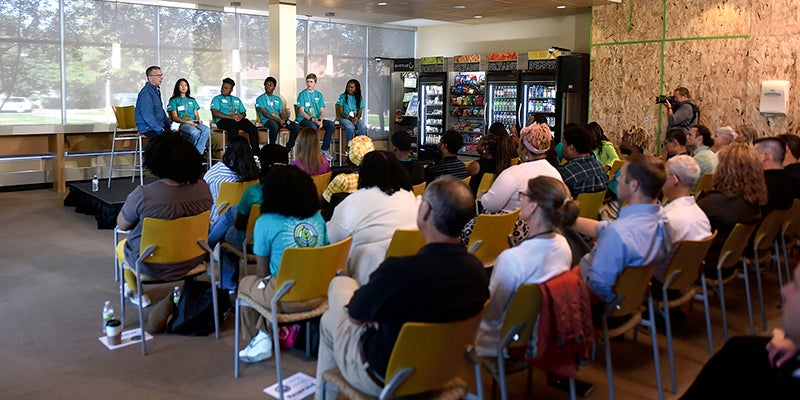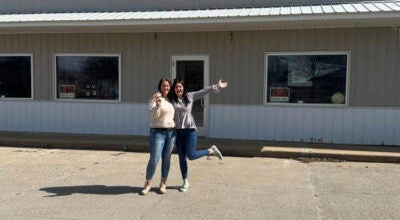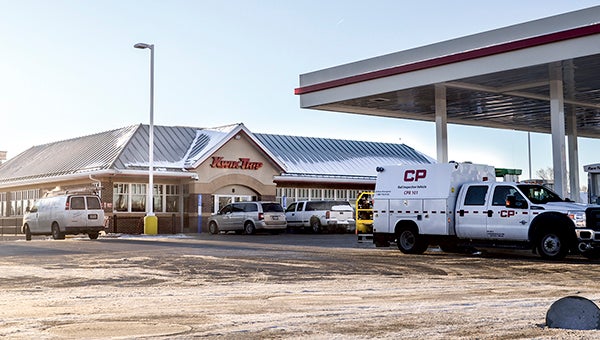Climate check: Most business sectors in Austin on the mend
Published 3:39 am Tuesday, March 12, 2013

Games People Play manager Corey Anderson has seen his share of hard times, but
believes the worst is behind Austin and the recession is easing locally. — Eric Johnson/Austin Daily Herald
—This feature originally appeared in Progress 2013. Get a copy at the Austin Daily Herald office, 310 Second St. NE.

Click on image to enlarge the unemployment rate for 2009-2012, which has steadily dropped over the past three years.
Corey Anderson says the 2012 holiday shopping season was one of the best Games People Play had in years.
He has managed the Austin clothing and screening specialty store for roughly 18 years, and while he’s not sure how the recent recession ranks, he knows sales were down in 2009. But they weren’t hit as hard as some other areas of the country, he says, and since then business has “absolutely picked up.”
“Three years ago was the worst, where it really seemed to slow down,” he said. “The [recession] that hit the country has affected us, but we’ve been lucky enough to have decent sales. … And sales were definitely up compared to the last few years.”
That’s the same picture many other business leaders in Austin are seeing.
“I think overall we didn’t have as large a downturn as other sectors of the country,” said Sandy Forstner, executive director of the Austin Area Chamber of Commerce. “Our unemployment rate remained below the state and national level, and that helped.”
The national jobless rate hovered just below 8 percent for much of 2012, and Minnesota’s rate was between 5.5 and 5.9 percent. But Austin’s rate was below 5 percent six times last year and was 4.5 percent in November and December 2012, according to the Minnesota Department of Employment and Economic Development. And as the national rate was above 9 percent for 20 of 24 months in 2009 and 2010, Austin’s highest during that span was 8 percent in March 2009, and it was below 7 percent for 18 months and below 6 percent for nine months.
Forstner said Austin’s agriculturally based economy and the success of Hormel Foods Corp. through the recession have kept the town from hitting the low much of the nation did.
“The ag economy has really gone through the best years I’ve ever seen,” Forstner said. “And Hormel has been adding jobs.”
Hormel — by far Austin’s largest employer, with 2,689 jobs between its Austin plant and corporate offices, not counting the 1,300 jobs at its meatpacking facility, Quality Pork Processors — added 135 jobs in Austin last year alone, and now has about 19,800 total jobs throughout its corporation, a huge jump from the roughly 12,000 in 2000, according to CEO Jeff Ettinger.
All that translates into more shoppers, Anderson says. But as the economy improves, one thing that may drag it down is consumer confidence.
“The media does play a role for some,” Anderson said. “The mindset as people are out thinking about spending, what they constantly hear is the country is struggling. That does play a role.”
Nowhere is that more evident than in the housing market.
Better than perceived
Home sales hit a four-year high in 2012 for Austin, but some locally are quick to point out that sector of the economy is one of the slowest to recover. One of the main culprits: hesitant buyers.
“We’ve been fighting that perception for years,” said Jerry Wolesky, associate broker and manager of the Fawver Agency in Austin. “The national perception is it’s the wrong time to buy, when it’s actually the right time to buy, mainly because of low interest rates.”
Wolesky said because the demand is lower, prices remain low. In addition, home loan interest rates in early 2013 were between 3.25 and 3.5 for a 30-year loan, and 2.5 to 3 percent for a 15-year loan, he said.
Meanwhile, the number of homes sold in Austin hit a four-year high in 2012, at 362, up from 357 in 2011, 303 in 2010 and 345 in 2009.
“Locally, we certainly seem to be doing better than we’ve been doing,” Wolesky said. “Each year seems to be doing a little bit better. The way the economy is now, we think we should improve in 2013 like we did in 2012 and 2011.”
Eating the bottom line
Steve Davis, owner of Steve’s Pizza in Austin, says the restaurant business is good and sales are going up, but so too is the cost of doing business.
“Sales have increased, but expenses have been going up,” he said.
Davis cites insurance costs, property taxes — which will increase for many commercial businesses in the county after a property value change begins this year — and the price of cheese as the three biggest hits to his bottom line.
“Food prices, especially dairy, have been going up and up,” he said. “We’re actually bringing in more money, but profits are less because of expenses.”
Davis said when dairy prices spike, he sometimes pays $1,500 to $2,000 more per month on cheese, and because he doesn’t increase his prices, that comes out of the bottom line.
“It fluctuates, and sometimes you just have to eat that increase,” he said. “We haven’t changed our menu prices for over seven years.”
But more business is always a good thing, and that’s been the trend in Austin, according to Forstner.
“Restaurants really saw a sharp downfall in business, but that seems to be improving,” Forstner said. “Everyone tightens the belt a little bit [during a recession], and as you tighten, you look at things you can cut that don’t have a dramatic affect, so you don’t eat out as much.”
Forstner said now that restaurants are doing better, it’s a clear indication people are feeling better about their jobs and the economy.
“I’ve been fortunate,” Davis said. “Our business has been good.”
Shop like it’s raining
Anderson lives in Austin, and buys into the Chamber’s “Buy Mower, Grow Mower” campaign.
He said when the weather is bad, he gets more business because Austinites are less likely to travel to Rochester or the Twin Cities in poor conditions. But he thinks residents should look locally first, and not make it an afterthought.
“I’m a firm believer in it,” Anderson said of the Chamber’s shop local campaign. “If I can buy anything local, I do to support the economy.”
He said a change in mindset, which is improving, will also help the local economy.
“It is positive now,” he said. “We’re starting to see some new businesses coming to town, and I love to see it grow. I definitely think we’re starting to see an upside.”






